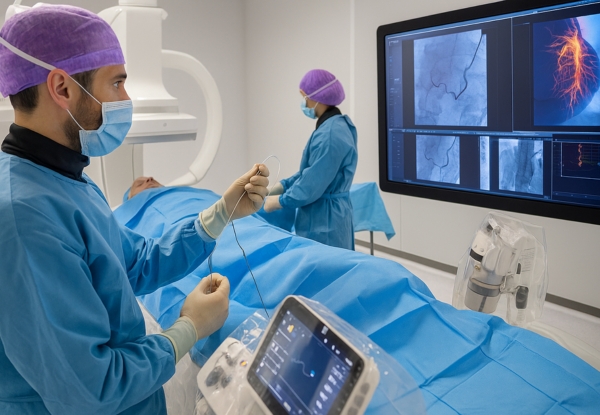
Introduction
Modern medical care is rapidly changing. With growing technology, patients now have access to treatments that are less invasive, less painful, and quicker to recover from. This is where an interventional radiologist plays a vital role. If you are wondering when it is necessary to consult an interventional radiologist, this article will answer your questions.
At Midas Care Clinic, we often meet patients who are unaware of how interventional radiology can help manage various conditions without major surgery. This guide will help you understand the symptoms, conditions, and procedures that fall under the expertise of an interventional radiologist specialist.
Understanding the Role of an Interventional Radiologist

An interventional radiologist is a doctor trained to perform minimally invasive procedures using advanced imaging like ultrasound, CT scans, or X-rays. These imaging tools guide the doctor during procedures, reducing the need for open surgery.
Main functions include:
- Diagnosing diseases using imaging guidance
- Treating conditions with small instruments through minor incisions
- Reducing recovery times compared to traditional surgery
They help manage medical issues like blocked blood vessels, tumours, uterine fibroids, and varicose veins, using non-surgical techniques.
Interventional Radiologist vs Radiologist
Many patients confuse these two roles. While both work with medical imaging, their responsibilities differ:
- Radiologist: Diagnoses diseases by studying X-rays, MRIs, CT scans, and other images.
- Interventional Radiologist: Uses imaging to perform procedures inside the body with minimal cuts.
An interventional radiologist specialist does not just read reports they treat the problem, often replacing the need for conventional surgery.
Common Interventional Radiology Procedures
At Midas Care Clinic, some of the frequently performed interventional radiology procedures include:
- Angioplasty and Stenting: Opening narrowed blood vessels
- Embolisation: Blocking abnormal blood flow to stop bleeding or shrink tumours
- Varicose Vein Treatment: Using laser or radiofrequency techniques
- Image-Guided Biopsy: Collecting tissue samples using imaging guidance
- Drainage of Abscesses or Fluid Collections
These treatments often require only a small incision and local anaesthesia.
Conditions Treated by Interventional Radiologist
An interventional radiologist specialist can manage various conditions, such as:
- Peripheral Artery Disease (PAD)
- Liver Tumours and Cancer Treatments
- Uterine Fibroids (Uterine Artery Embolisation)
- Varicose Veins and Spider Veins
- Prostate Enlargement (Prostate Artery Embolisation)
- Deep Vein Thrombosis (DVT)
- Blocked Bile Ducts or Kidney Stones
By using advanced imaging, the doctor ensures accurate treatment with minimal risk.
Symptoms That May Require Interventional Radiology
You might need to consult an interventional radiologist if you experience:
- Persistent leg pain or swelling (possible vascular issues)
- Unexplained bleeding or blood vessel problems
- Non-healing ulcers on legs or feet
- Fibroids causing heavy periods or pain
- Abdominal pain linked with fluid collection or liver issues
- Cancer that needs targeted treatment without surgery
Early consultation can help prevent complications and reduce treatment time.
Why Choose an Interventional Radiologist Specialist at Midas Care Clinic
Choosing a specialist at Midas Care Clinic comes with benefits such as:
- Expertise in the latest imaging and treatment techniques
- Minimally invasive methods with quicker recovery
- Advanced technology for accurate diagnosis and treatment
- Personalised care for each patient
- Coordination with other specialists for complete care
Our clinic focuses on providing precise, safe, and effective interventional radiology care under the guidance of experienced professionals.
Meet Dr. Chandrakant – Interventional Radiologist Specialist
Dr. Chandrakant, a leading interventional radiologist specialist at Midas Care Clinic, brings years of expertise in minimally invasive treatments. Patients appreciate his thorough approach, clear explanations, and patient-first attitude.
His areas of focus include:
- Vascular interventions
- Cancer therapies
- Uterine fibroid treatment
- Varicose vein procedures
With Dr. Chandrakant, you are assured of evidence-based, patient-friendly treatment.
What Happens During Interventional Radiology Procedures?
Most procedures performed by an interventional radiologist involve these steps:
- Imaging Guidance: Ultrasound, CT, or X-rays guide the procedure
- Small Incision: Typically a pinhole-sized entry point
- Catheter or Needle Insertion: Used to reach the treatment area
- Treatment Delivery: Medication, stents, or devices are placed as required
- Monitoring: Imaging ensures accuracy throughout
These procedures are often done under local anaesthesia, meaning no long hospital stays.
Are Interventional Radiology Procedures Safe?
Safety is a top concern at Midas Care Clinic. Interventional radiology is considered low-risk when performed by a qualified interventional radiologist specialist like Dr. Chandrakant.
Benefits include:
- Minimal scarring
- Reduced infection risk
- Short recovery periods
- Less hospital time compared to open surgery
However, like any medical procedure, a personalised assessment is always done before proceeding.
Frequently Asked Questions
Q1. What is the difference between an interventional radiologist and a regular radiologist?
Answer: A radiologist diagnoses illnesses through imaging. An interventional radiologist treats conditions using image-guided procedures.
Q2. Are interventional radiology procedures painful?
Answer: Most procedures cause minimal discomfort and are done with local anaesthesia.
Q3. Can interventional radiology treat varicose veins?
Answer: Yes, laser or radiofrequency methods are used by interventional radiologists to treat varicose veins effectively.
Q4. Is hospital admission necessary for interventional radiology procedures?
Answer: Many procedures are done on an outpatient basis. However, complex cases might need short hospital stays.
Q5. How do I book an appointment with an interventional radiologist specialist at Midas Care Clinic?
Answer: You can contact Midas Care Clinic directly for consultations with Dr. Chandrakant.
Q6. Are there risks associated with interventional radiology procedures?
Answer: Risks are minimal, but your doctor will explain any specific concerns based on your condition.
Q7. Does insurance cover interventional radiology treatments?
Answer: Many insurance plans cover these procedures. It is advisable to check with your provider.
Q8. Can interventional radiology be used for cancer treatment?
Answer: Yes, certain cancers can be treated using targeted procedures like embolisation or radiofrequency ablation.
Conclusion
If you are facing health issues that require precise treatment with minimal downtime, consulting an interventional radiologist specialist may be the right choice. From blocked arteries to targeted cancer treatments, an interventional radiologist offers effective solutions that avoid the need for traditional surgery.
At Midas Care Clinic, under the expert care of Dr. Chandrakant, patients receive trusted advice and advanced treatment options for a variety of conditions.
To know more or book your appointment, reach out to Midas Care Clinic today.

